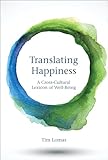Translating happiness: a cross--cultural lexicon of well-being
Material type: TextPublication details: London MIT Press 2018Description: xv, 223 pISBN:
TextPublication details: London MIT Press 2018Description: xv, 223 pISBN: - 9780262537087
- 158 LOM
| Item type | Current library | Collection | Call number | Copy number | Status | Date due | Barcode | |
|---|---|---|---|---|---|---|---|---|
 Book
Book
|
Indian Institute of Management LRC General Stacks | Human Resource and Organization Behvaiour | 158 LOM (Browse shelf(Opens below)) | 1 | Available | 009259 |
Western psychology is rooted in the philosophies and epistemologies of Western culture. But what of concepts and insights from outside this frame of reference? Certain terms not easily translatable into English—for example, nirvāṇa (from Sanskrit), or agápē (from Classical Greek), or turangawaewae (from Māori)—are rich with meaning but largely unavailable to English-speaking students and seekers of wellbeing. In this book, Tim Lomas argues that engaging with “untranslatable” terms related to well-being can enrich not only our understanding but also our experience. We can use these words, Lomas suggests, to understand and express feelings and experiences that were previously inexpressible.
Lomas examines 400 words from 80 languages, arranges them thematically, and develops a theoretical framework that highlights the varied dimensions of well-being and traces the connections between them. He identifies three basic dimensions of well-being—feelings, relationships, and personal development—and then explores each in turn through untranslatable words. Ânanda, for example, usually translated as bliss, can have spiritual associations in Buddhist and Hindu contexts; kefi in Greek expresses an intense emotional state—often made more intense by alcohol. The Japanese concept of koi no yokan means a premonition or presentiment of love, capturing the elusive and vertiginous feeling of being about to fall for someone, imbued with melancholy and uncertainty; the Yiddish term mensch has been borrowed from its Judaic and religious connotations to describe an all-around good human being; and Finnish offers sisu—inner determination in the face of adversity.
Expanding the lexicon of well-being in this way showcases the richness of cultural diversity while reminding us powerfully of our common humanity. Lomas's website, www.drtimlomas.com/lexicography, allows interested readers to contribute their own words and interpretations.
(https://mitpress.mit.edu/9780262537087/translating-happiness/#:~:text=Tim%20Lomas%20is%20a%20Research,Scientific%20American%2C%20and%20the%20Atlantic.)
There are no comments on this title.

